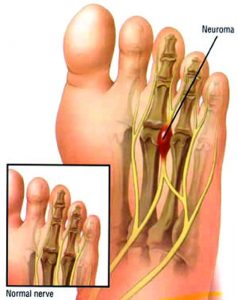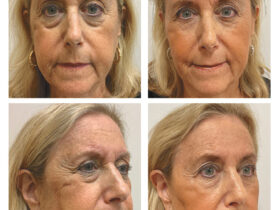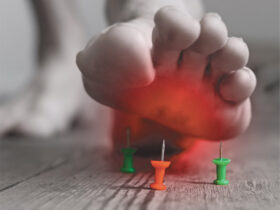Dr. Michael J. Petrocelli,
 More than 75% of people in the United States will experience foot disorders. A large percentage of these individuals are in the aging population, but other factors can contribute to foot pain, like standing on your feet for extended periods of time, ill-fitting shoes, hereditary and genetic disorders, excessive exercise, trauma, and diseases. However, one of the most common foot disorders is caused by injury to the nerves and tissue fibers of the ball of the foot and toes called neuromas.
More than 75% of people in the United States will experience foot disorders. A large percentage of these individuals are in the aging population, but other factors can contribute to foot pain, like standing on your feet for extended periods of time, ill-fitting shoes, hereditary and genetic disorders, excessive exercise, trauma, and diseases. However, one of the most common foot disorders is caused by injury to the nerves and tissue fibers of the ball of the foot and toes called neuromas.
Neuromas are pinched nerves or nerve tumors that grow increasingly painful. They can even cause tingling and numbness in the area. The causes are trauma to the foot, injury, and genetics, but the most common cause of neuromas is wearing shoes that are too tight or too high. So for all of the women out there wearing extremely high heels or pointy shoes, you may be on the cusp of a painful dilemma.
Symptoms and Details of Neuromas:
• Discomfort in the ball of the foot
• Neuromas involve an overgrowth of nerve tissue that forms a firm bundle usually between the third and fourth toe
• Non-cancerous (benign)
• Tight shoes, high heels, and excessive sports or overactivity may cause neuromas to form
The American Podiatric Medical Association describes Neuromas in the following way and Dr. Petrocelli agrees:
What is a Neuroma?
A neuroma is a painful condition, also referred to as a “pinched nerve” or a nerve tumor. It is a benign growth of nerve tissue frequently found between the third and fourth toes. It brings on pain, a burning sensation, tingling, or numbness between the toes and in the ball of the foot.
The principal symptom associated with a neuroma is pain between the toes while walking. Those suffering from the condition often find relief by stopping their walk, taking off their shoe, and rubbing the affected area. At times, the patient will describe the pain as similar to having a stone in his or her shoe. The vast majority of people who develop neuromas are women.
Causes
Although the exact cause for this condition is unclear, a number of factors can contribute to the formation of a neuroma:
• Biomechanical deformities, such as a high-
arched foot or a flat foot, can lead to the formation of a neuroma. These foot types bring on instability around the toe joints, leading to the development of the condition.
• Trauma can cause damage to the nerve, resulting in inflammation or swelling of the nerve.
• Improper footwear that causes the toes to be squeezed together is problematic. Avoid high-heeled shoes higher than two inches. Shoes at this height can increase pressure on the forefoot area.
• Repeated stress, common to many occupations, can create or aggravate a neuroma.
Your Treatment Options
Typically a conservative approach is the first step. Your podiatrist will recommend the resting the area as much as possible. Your physician may also prescribe NSAIDs or other forms of pain relief; along with orthotics we’re bracing methods. Self-massage and soaking the feet in warm Epsom salt water often help to relieve the painful discomfort of neuromas temporarily. Your doctor may also suggest steroid injections to help control your level of discomfort
It’s crucial that you do not wear high heels of 2 inches or more if you are experiencing neuromas it’s best to wear a wide foot based shoe that has a small wedge or flat cushioned sole. If resting and applying ice do not relieve your pain there are surgical methods that will alleviate the Neuroma and will allow you to live a freer lifestyle.
The surgery is quick and simple as the doctor minimally invasively repairs the nerves through a tiny port in the ball of your foot. The recovery time is just a few weeks, usually 2-6 depending on your specific needs and compliance level.
Collier Podiatry is the area’s expert on foot pain and disorders. Their kind and well-trained staff are ready to answer your questions and concerns and get you back on your feet again. If you are noticing any foot discomfort or changes, it’s critical to see a podiatrist. Dr. M. Petrocelli has been practicing podiatric medicine for well over 20 years. He is an expert in his field and a leader to his peers.
If you are experiencing any foot pain or foot conditions, please contact Collier Podiatry at (239) 775-0019, or visit their website at www.collierpdiatry.com
239-775-0019
www.collierpodiatry.com
Collier Podiatry
NCH Countryside Commons
1715 Heritage Trail, Suite 204
Naples, FL 34112
Phone: (239) 775-0019
Fax: (239) 775-0219
Email: CollierAppointments@gmail.com









